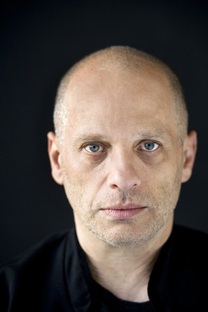 Composer David Lang.
Composer David Lang. The piece – as I experienced it on Friday night – isn’t hard to describe. Four instrumentalists (playing flutes, clarinets, cello and percussion) accompany a soprano, who spends the greater part of 70 minutes whispering a fragmentary text. (There’s a bit of singing at the end.) The small audience – only about 50 people are admitted to a performance – sits in little cul-de-sacs cut into the stage, cleverly designed so that everyone has a front-row seat and yet only a partial view.
Soprano Tony Arnold was at the centre of it all – quite literally, as most of the time she was stationed in the exact middle of the stage. She skillfully combined her stage-whispering – a grueling thing to do with the voice for an extended length of time – with conducting, cueing the instrumentalists on each tiny chord they played. At the end of the piece, she sang a pretty little vocalise off stage, sempre sotto voce.
Meditative and ritualistic, this “opera” feels like a cross between a Noh drama and a tranquility tank. Musically, it reminded me of Arvo Pärt’s Spiegel im Spiegel, or maybe something by John Cage, or (in some ways) a site-specific work of R. Murray Schafer.
But if The Whisper Opera is easily described, it’s not so easily explained. It’s a cryptic and inscrutable thing, implicit rather than explicit, and open to diverse interpretations. The program notes explain that the text – disconnected, fragmentary phrases such as “I think about you and dream of us together” – is based on Google searches. Be that as it may, anyone who didn’t first read the program-notes would have no knowledge of this, and it probably wouldn’t matter much.
Concerning his intentions for The Whisper Opera, the composer writes, “A piece like this would have to be experienced live,” adding that it “can never be recorded, or filmed, or amplified.” Ironically, despite the technological origins of the text, The Whisper Opera takes an anti-technological stance.
Personally, I don’t think The Whisper Opera is really about the internet, the meaning of meaning, social connection, or social disconnection. The piece succeeds as “absolute music.” It is so open-ended in its message and so inward-looking in its presentation that, ultimately, it is about itself. I feel privileged to belong to the .00001 percent of humanity that will ever hear and see it.
© Colin Eatock 2015
 RSS Feed
RSS Feed

